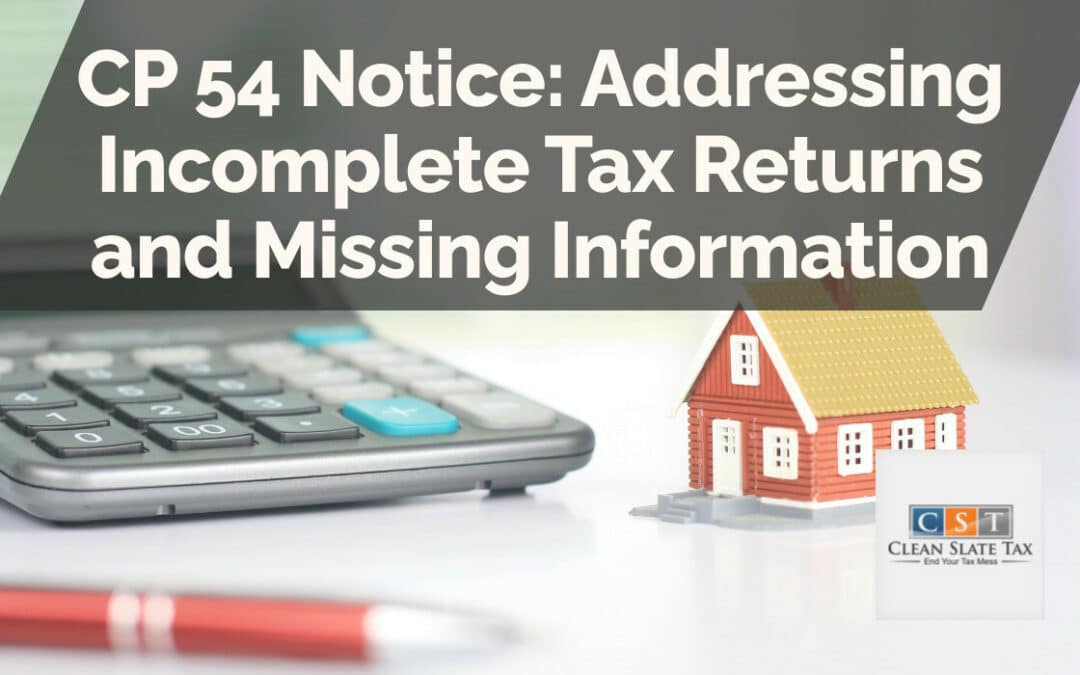Incorrect or incomplete tax returns can lead to unwanted attention from the Internal Revenue Service (IRS). One common issue taxpayers face is receiving a CP 54 notice. A CP 54 notice is sent by the IRS when there is a discrepancy or missing information in your tax return. In this article, we delve deeper into what a CP 54 notice is, how you can address it, and the importance of avoiding these kinds of issues in the future.
What is a CP 54 Notice?
A CP 54 Notice is sent by the IRS when they suspect that there is missing or unreported information on your tax return. This might occur if the name or social security number on your tax return does not match the information the IRS has on file. Essentially, the IRS needs more information to accurately process your return.
Why did You Receive a CP 54 Notice?
There are several reasons why you might receive a CP 54 notice. The most common reasons include failing to report all your income, having discrepancies between your tax return and the information reports provided by your employer or other institutions, or entering incorrect personal information such as your name, address, or social security number.
How to Respond to a CP 54 Notice?
Upon receiving a CP 54 notice, don’t panic. The notice will explain the issues with your tax return and instruct you on how to remedy the situation. Your first step should be to review the notice and verify the information. If the IRS made a mistake, submit a written explanation along with supporting documentation to the address specified on the notice.
When You Agree with the Notice
If you agree with the notice and the adjustments the IRS suggests, you will need to sign and return the notice. If you owe additional tax, you will need to arrange payment.
When You Disagree with the Notice
If you disagree with the information or the adjustments suggested by the IRS, you should still respond in writing. Explain why you disagree and include any documentation to support your case. You may also want to consider consulting with a tax professional.
- Consider a Payment Plan:
- Hire a Tax Professional:
If you agree with the suggested adjustments but cannot afford to pay, you may be eligible for a payment plan with the IRS. Payment plans allow you to pay off your tax debt in smaller, more manageable installments.
If you find the notice confusing or you’re unsure how to respond, it may be beneficial to seek the help of a tax professional. They can help you understand the notice, gather the necessary documentation, and draft a response.
Frequently Asked Questions (FAQs) about CP 54 Notice
What will happen if I ignore a CP 54 notice?
If you ignore a CP 54 notice, the IRS may adjust your return based on the information it has or assess additional tax. Ignoring the notice also increases the risk of penalties.
Can a CP 54 notice lead to an audit?
Possibly. If the IRS suspects tax fraud or determines that there are larger issues with your tax return, a CP 54 notice could potentially lead to a full audit.
How long do I have to respond to a CP 54 notice?
Typically, you have 30 days to respond to a CP 54 notice. However, it’s best to respond as soon as possible to avoid further complications.
Addressing the issues highlighted in your CP 54 notice promptly and accurately is crucial to avoid potentially escalating problems with the IRS. While the process can be stressful, understanding the notice and responding correctly can help to rectify the situation and help you move forward more confidently in future tax situations.





